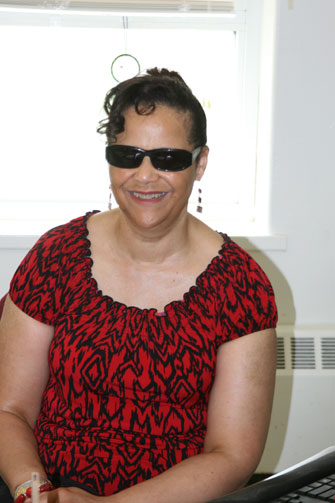How do we build resilient girls? How do you build resiliency in your own life?

Aleatha M. Dickerson has served as project manager for the Rhode Island Senior Medicare Patrol Project at the Rhode Island Department of Human Services, Division of Elderly Affairs. She is also program manager for the Rhode Island Title IIIC Congregate and Home Delivered Nutrition Programs; and program manager for the Rhode Island Title IIID Health Promotion and Medication Management program grants. In addition, she serves as project director for the Commodities Supplemental Food Program. Dickerson previously worked for the Rhode Island Services for the Blind and Visually Impaired Independent Living Program as a rehabilitation teacher. She earned a Master of Science degree from the University of Rhode Island and has a Bachelor of Science degree from Rhode Island College.
photo by Agapao Productions
Take time to be thankful for the present, this gift of life. Enjoy the simple things, but don’t be afraid to work and play hard. Learn from past experiences, the good as well as the struggles. Explore options as you prepare to move into the future. Look to the positive and accept those things we do not have control of. Build on your abilities, rather than focusing on what you are unable to do. Have patience. Finally, always respect yourself and treat others with respect and dignity.
Throughout my life I have had to overcome numerous bridges as I worked to achieve my goals. I guess you might call me stubborn, but when faced with a challenge, I tend to dig my heels in and become determined to find a way to move forward. I hope I might be a positive role model for my daughter, granddaughters, nieces and the other girls and women in my life to encourage them that they may overcome the struggles.
In 1987, I had a severe illness which altered my life in ways I could never have imagined. As a wife, mother of four young children, and a pathology technologist working full-time, I was suddenly faced with a very serious illness which left me in pain, physically weak and visually impaired.
However, during the initial two-month hospital stay, I focused on my faith in God to give me courage and strength. I made a conscious decision to accept the situation, but was determined to move forward to do all I could to live a full life regardless of the new limitations.
With the support of my husband Keith, my mother, and other family members, I set out on this new path. I reflected on past experiences to learn how to accomplish the simplest daily tasks. Everyday things, such as grooming, having a meal and other daily activities had become challenging. I had to find patience with myself and also with some people trying to offer what I perceived as too much help. After many surgeries over several years which made me pain free, and a long rehabilitation, I learned how to get around independently to meet my daily needs and to take care of my young family.
By volunteering in the community and learning to use a computer with special software, I improved my skills and knowledge. I wanted to resume having a career. After several years, I dared to enroll in a graduate program and enjoyed earning a Master’s of Science degree.
One important lesson I have learned is that although I like to think of myself as a woman with a very independent spirit, I realize there are times when we all need to accept support and assistance from others. Support might come from family or friends, but there are also service providers and resources available along the way to help us through this interesting adventure we call life.

